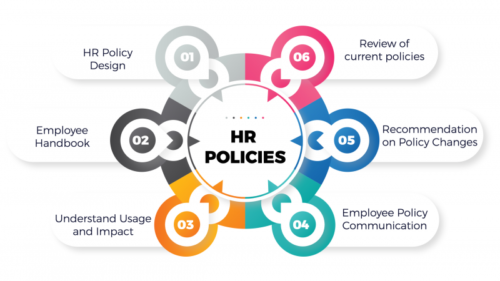Implementing effective HR policies is crucial for any business to maintain a productive and harmonious work environment while ensuring legal compliance and protecting both the company and its employees. Here are some essential HR policies that every business should consider:
- Equal Employment Opportunity (EEO) Policy: This policy ensures that all employment decisions are based on merit, qualifications, and business needs, without regard to factors such as race, gender, age, religion, disability, or sexual orientation. It promotes diversity and inclusion in the workplace.
- Anti-Discrimination and Anti-Harassment Policy: This policy prohibits discrimination and harassment of any kind, including but not limited to, verbal, physical, or visual harassment based on protected characteristics. It outlines procedures for reporting and addressing complaints and ensures a safe and respectful workplace for all employees.
- Code of Conduct and Ethics Policy: This policy sets forth the standards of behavior expected from employees, including honesty, integrity, and compliance with laws and regulations. It helps maintain the company’s reputation and fosters trust among employees, customers, and stakeholders.
- Employee Classification and Working Hours Policy: This policy defines employee classifications (e.g., full-time, part-time, contractor) and outlines working hours, breaks, overtime, and attendance expectations. It ensures compliance with labor laws and helps manage scheduling and staffing effectively.
- Compensation and Benefits Policy: This policy outlines the company’s compensation structure, including wages, bonuses, and benefits such as health insurance, retirement plans, and paid time off. It promotes fairness and transparency in compensation practices and helps attract and retain talent.
- Leave of Absence Policy: This policy specifies the types of leave available to employees, such as sick leave, vacation, parental leave, and bereavement leave, along with eligibility criteria and procedures for requesting and approving leave. It ensures consistency and compliance with relevant laws and regulations.
- Employee Performance and Evaluation Policy: This policy establishes performance expectations, evaluation processes, and feedback mechanisms to help employees understand their roles and responsibilities, receive constructive feedback, and develop professionally. It supports employee growth and performance improvement.
- Health and Safety Policy: This policy prioritizes the health and safety of employees by outlining procedures for accident prevention, emergency response, workplace inspections, and compliance with occupational health and safety regulations. It fosters a culture of safety and reduces the risk of workplace injuries and illnesses.
- Information Security and Data Privacy Policy: This policy safeguards sensitive company information and employee data by establishing protocols for data handling, access control, confidentiality, and compliance with data protection laws. It protects against data breaches and unauthorized access to information.
- Employee Separation and Termination Policy: This policy outlines procedures for voluntary and involuntary employee separations, including resignation, termination, and layoffs. It ensures fairness, compliance with legal requirements, and the protection of the company’s interests during employee transitions.
By implementing these essential HR policies, businesses can create a supportive, compliant, and productive work environment that attracts and retains top talent while mitigating risks and promoting organizational success.
Start your HR journey confidently! Get certified with Next Innovation Asia, Chennai’s top HR Training Institute. Gain practical skills and job support for a successful HR career. Join us and unlock your potential in HR!

